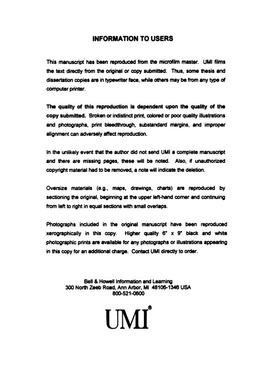| dc.contributor.advisor | Cavallo, Ann M. L., | en_US |
| dc.contributor.author | Reap, Melanie Ann. | en_US |
| dc.date.accessioned | 2013-08-16T12:30:48Z | |
| dc.date.available | 2013-08-16T12:30:48Z | |
| dc.date.issued | 2000 | en_US |
| dc.identifier.uri | https://hdl.handle.net/11244/5912 | |
| dc.description.abstract | The learning cycle paradigm had been used in science classrooms for nearly four decades. This investigation seeks to reveal how the 1earning cycle, as originally designed, is currently understood and implemented by teachers in authentic classroom settings. The specific purposes of this study were: (1) to describe teachers who use the learning cycle and compare their understandings and perceptions of the learning cycle procedure in instruction; (2) to elicit novice and master teacher perspectives on their instruction and determine their perception of the process by which learning cycles are implemented in the science classroom; (3) to describe the context of science instruction in the novice and master teacher's classroom to ascertain how the teacher facilitates implementation of the learning cycle paradigm in their authentic classroom setting. The study used a learning cycle survey, interviews and classroom observations using the Learning Cycle Teacher Behavior Instruments and the Verbal Interaction Category System to explore these features of learning cycle instruction. The learning cycle survey was administered to a sample of teachers who use the learning cycle, including master and novice learning cycle teachers. One master and one novice learning cycle teacher were selected from this sample for further study. Analysis of the surveys showed no significant differences in master and novice teacher understandings of the learning cycle as assessed by the instrument. However, interviews and observations of the selected master and novice learning cycle teachers showed several differences in how the paradigm is understood and implemented in the classroom. The master learning cycle teacher showed a more developed teaching philosophy and had more engaged, extensive interactions with students. The novice learning cycle teacher held a more naive teaching philosophy and had fewer, less developed interactions with students. The most significant difference was seen in the use of questioning and discussion. The master teacher used diverse questioning techniques and guided students in discussion of their findings while the novice teachers used more rote response questions and controlled the discussion. The findings of this study have implications for science teacher education, especially in the preparation of teachers in science methods courses and student teaching, and in in-service education programs. | en_US |
| dc.format.extent | xii, 117 leaves : | en_US |
| dc.subject | Education, Teacher Training. | en_US |
| dc.subject | Education, Curriculum and Instruction. | en_US |
| dc.subject | High school teachers. | en_US |
| dc.subject | Science teachers. | en_US |
| dc.subject | Education, Sciences. | en_US |
| dc.subject | Education, Secondary. | en_US |
| dc.subject | Science Study and teaching (Secondary) | en_US |
| dc.subject | Teaching. | en_US |
| dc.title | Master and novice secondary science teachers' understandings and use of the learning cycle. | en_US |
| dc.type | Thesis | en_US |
| dc.thesis.degree | Ph.D. | en_US |
| dc.thesis.degreeDiscipline | Department of Instructional Leadership and Academic Curriculum | en_US |
| dc.note | Source: Dissertation Abstracts International, Volume: 61-02, Section: A, page: 0484. | en_US |
| dc.note | Adviser: Ann M. L. Cavallo. | en_US |
| ou.identifier | (UMI)AAI9960909 | en_US |
| ou.group | Jeannine Rainbolt College of Education::Department of Instructional Leadership and Academic Curriculum | |
